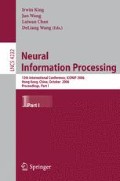Abstract
Identification tasks are experimented on multi-layered self-organizing maps with feedback, using strings of category symbols of English sentences. Training is carried out in a setting that approximates language acquisition by human infants as closely as possible. Novel strings that are not used in training are tested whether they can be identified as grammatical or not. Test strings can be longer with no finite bounds than the trained strings, with recursions within themselves, just as natural language syntax allows.
Access this chapter
Tax calculation will be finalised at checkout
Purchases are for personal use only
Preview
Unable to display preview. Download preview PDF.
References
Elman, J.L.: Finding Structure in Time. Cognitive Science 14, 179–211 (1990)
Chomsky, N.: Rules and Representation. Basil Blackwell, Oxford (1980)
Baker, C.L. (ed.): The Logical Problem of Language Acquisition. MIT Press, Cambridge (1981)
Pinker, S.: Language Learnability and Language Development. Harvard University Press, Cambridge (1984)
Gordon, P.: Learnability and Feedback. Developmental Psychology 26, 217–220 (1990)
Kohonen, T.: Self-Organizing Maps. Springer, Heidelberg (1995)
Chappell, J.G., Taylor, J.G.: The Temporal Kohonen Map. Neural Networks 6, 441–445 (1993)
Versta, M., Heikkonen, J., Del Ruiz Millán, J.: Context Learning with the Self-Organizing Map. In: Proceedings of the Workshop on Self-Organizing Maps 1997, pp. 197–202 (1997)
Horio, K., Yamakawa, T.: Feedback Self-Organizing Map and Its Application to Spatio-Temporal Pattern Classification. International Journal of Computational Intelligence and Applications 1, 1–18 (2001)
Wakuya, H., Harada, H., Shida, K.: An Architecture of Self-Organizing Map for Temporal Signal Processing and Its Application to a Braille Recognition Task. IEICE Transactions on Information and Systems J87DII, 884–892 (2004)
Gold, E.M.: Language Identification in the Limit. Information and Control 10, 447–474 (1967)
Chomsky, N.: The Minimalist Program. MIT Press, Cambridge (1995)
Cinque, G.: Adverbs and Functional Heads: A Cross-Linguistic Perspective. Oxford University Press, Oxford (1999)
Radford, A.: Transformational Grammar. Cambridge University Press, Cambridge (1988)
Author information
Authors and Affiliations
Editor information
Editors and Affiliations
Rights and permissions
Copyright information
© 2006 Springer-Verlag Berlin Heidelberg
About this paper
Cite this paper
Mizushima, F., Toyoshima, T. (2006). Language Learnability by Feedback Self-Organizing Maps. In: King, I., Wang, J., Chan, LW., Wang, D. (eds) Neural Information Processing. ICONIP 2006. Lecture Notes in Computer Science, vol 4232. Springer, Berlin, Heidelberg. https://doi.org/10.1007/11893028_26
Download citation
DOI: https://doi.org/10.1007/11893028_26
Publisher Name: Springer, Berlin, Heidelberg
Print ISBN: 978-3-540-46479-2
Online ISBN: 978-3-540-46480-8
eBook Packages: Computer ScienceComputer Science (R0)

